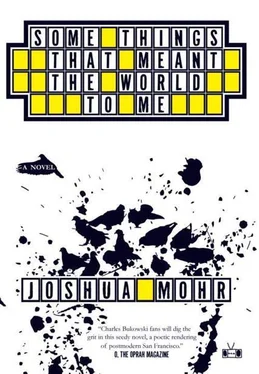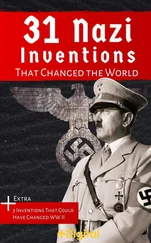
After I left Karla's house, I stood at a bus stop, shivering in a T-shirt. I'd left my jacket in her apartment. The fog had reached the outer Mission district and I didn't have enough money for a cab and couldn't walk the twenty blocks to my apartment, not after the beating that guy had given me.
I stood there, covered in piss. Clammy humiliation fastened all over me. Stood there, making fists, my maracas so cold, tingly. I blew into them, almost hyperventilating, trying to heat them up, but my breath smelled acrid as it ricocheted off of my palms and slipped up my nose. Stood there trying to understand why Karla would do that to me. Trying to fathom how you treat a hero like filth. How you mock the man who saved your life, calling him pathetic little halt'. How you make your hero feel so tiny that you'd need a microscope to know he was there.
Me, Rhonda, standing at the bus stop, shuddering and making fists, trying to understand what had happened, why it had happened, but the longer I stood on the empty street, no cars going by except an occasional taxi that I couldn't afford, things in my head mutated, whirled, and then it wasn't Karla's fault. No, there was nothing wrong with her; she hadn't done a thing. It was me, making all the wrong choices. It was my fault. I'd taken a night that could have been perfect and dismantled it. It was like what I'd done in Phoenix, and right when I thought about that place, that time, my mom, Letch, the antifreeze, that was when I saw the kid.
I didn't know it was a kid, at first, only a shadow, facing me. I could feel it staring, standing directly across the street. The shadow flashed a light, off and on, off and on. And then he called to me, "Do you know Morse code?" It flashed, off and on, different intervals between the light and dark.
"Me?" I said, squinting.
"This is an S-0-S!"
"What is?"
The boy walked across the street, toward me. The light still flashing. Coming from the boy's arms. As he got closer, I could see that he held a miner's helmet.
I shielded my eyes. "Do you mind?"
"Do you like magic?" He put the helmet on his head, its light left on.
He looked familiar, eleven, maybe twelve years old.
"Can you magically make the bus come?" I said.
"Would you like to see a trick?"
"Go ahead."
"Not here"
"Do I know you?"
He laughed, flipping his helmet's light off. "Do you know me?" He laughed harder. "That's a good one"
The feeling in my hands changed. They weren't buzzing anymore. No. Now they felt like apples. Apples with worms slinking through their tainted meat.
He flipped the light back on. Blinding. I put my hands up, trying to block it out. I said, "You're hurting my eves," and he said, "Aren't you used to getting hurt?" and I got a pounding headache. Things I didn't think about. Things I never let myself think about traveled over old and rusted wires. Flashes of old footage. Static and flickers and frames. Images of this boy. All the stuff that Dr. Angel-Hair told me wasn't real: the way our house's rooms had drifted away from one another, the sidewinders who loved me.
"Who are you?" I said, my shivers getting worse, my worm-riddled hands still held up to try and shield my eyes from his helmet's vicious beam.
"I'm Rhonda," he said. "I'm you."

This was later. Maybe an hour. After we'd walked back to my apartment, my hand on the kid's shoulder, using him like a human crutch. After we walked down 24th Street toward Valencia, past a group of young Latinos standing in front of a taqueria, El Farolito, listening to hip-hop. After we turned onto Valencia Street and saw the hulking shapes of dormant construction equipment parked on the side of the road, those monsters of renovation. After we stepped on a message that someone had stenciled on the sidewalk in purple spray paint: An eye for an eye and the i orldgoes blind. After the wind pushed an open umbrella by us, which was weird because it hadn't rained in six or seven months. After little-Rhonda helped me up the stairs of my building. After I put a jacket on, and after he watched me drink a couple of beers.
"We have to go," little-Rhonda said. The light on his helmet was still on, but besides that, he looked like a typical kid: jeans, sneakers, a T-shirt. Dark hair and green eyes.
"This isn't real," I said. "Like the sidewinders."
"These sidewinders?" he said, jamming his hand in his pocket and coming out with two of them. They slithered up his arm, each coiling on one of his shoulders and purring.
"They're real?"
"Of course, they're real."
I stuck my face up to one of the snakes, its tongue flitting against my cheek. "What are you doing here?" I asked littleRhonda.
"I'm your escort."
"To where?"
The snakes moved back down his arm and into his pocket: "You're going to love this."

I lived on the corner of 20th and Valencia, above a used bookstore. About five a.m. little-Rhonda and I walked to a dumpster a few blocks away. The streets were almost deserted, except for some homeless people leaning against a French restaurant, smoking. One of the guys had his shopping cart tied to his thigh with an extension cord, so no one could steal it once he fell asleep. He asked little-Rhonda and me if we had any vodka to donate to charity.
"What charity?" I said.
"This one," he said and opened his mouth, pointing down his throat.
The fog had gone, a crescent moon visible, which was yellow and lay on its side looking like a jaundiced smile.
When we got to the dumpster, little-Rhonda told me to climb inside of it.
v.
"Trust me," he said.
"Why?„
"Because I'm the only person who hasn't hurt you."
I heard a rattle come from little-Rhonda's pocket, some purring-assurance from an old friend.
The dumpster was stashed behind another taqueria. It must have dumped the leftover food that couldn't be saved, because the dumpster was totally full. There were pinto and black beans, chicken, prawns, beef, guacamole, smashed chips. In one corner, what looked like tortilla soup dribbled through the trash; at least, I hoped it was tortilla soup.
"Get in," he said.
"For what?"
"At the bottom, there's a trapdoor."
I stood on top of the trash, trying to kick some to the sides, to burrow lower without having to get my hands dirty, but it wasn't working. I tried to tell myself that this made sense. That it made sense because I was doing this for me. For littleRhonda. If anyone else had asked, I would have said no. But this was different. Plus he had the sidewinders, and the snakes always loved me and they wouldn't let anything bad happen so I dropped to my knees, right there in the dumpster, dropped to them and used my hands to scoop all that food and trash out of the way, but it was like trying to dig a hole in sand, in the desert, grains sliding back into the space I'd just cleared. I looked at little-Rhonda and said, "Why don't you help me?" and he said, "I am," and I said, "No, why don't you get in here and help me?" and he said, "Keep digging." I threw the trash out, onto the sidewalk, really digging deep. I shoveled all that wasted food, and when I finally reached the bottom, little-Rhonda was right: there was a trapdoor. I opened it. I saw a ladder but couldn't see how far down it went.
"I found it," I said, but he didn't answer me. I stood up, looked all around, but he was gone.

Читать дальше















